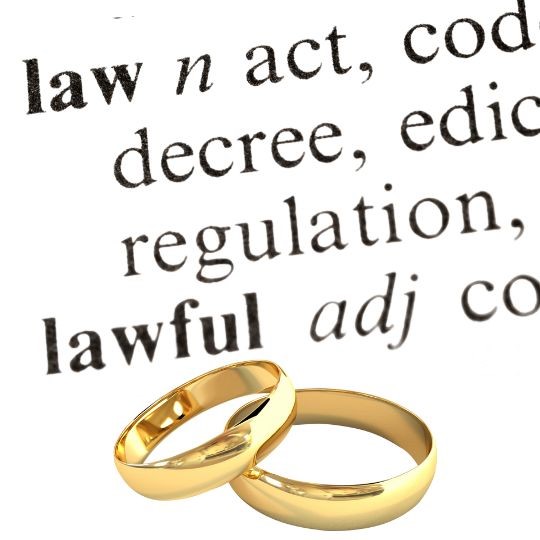Why it is Lawful Wedded, not Lawfully Wedded
Categories: | Vows |
 Do you want to
know the secret behind the legal lingo of "lawful
wedded" as part of your legal marriage vows? And
why I might have to correct you if you say it don't
say it exactly as the Marriage Act requires? Get ready
to put those grammar skills to the test, because it
turns out the difference between "lawful wedded" and
"lawfully wedded" is more than just a matter of
syntax.
Do you want to
know the secret behind the legal lingo of "lawful
wedded" as part of your legal marriage vows? And
why I might have to correct you if you say it don't
say it exactly as the Marriage Act requires? Get ready
to put those grammar skills to the test, because it
turns out the difference between "lawful wedded" and
"lawfully wedded" is more than just a matter of
syntax.While the two phrases may seem interchangeable, they actually carry vastly different legal meanings. The key lies in the one word you're allowed to drop when you say the legal vows - either "lawful" or "wedded". You can take your partner as your "lawful spouse" or your "wedded spouse", but simply taking them as your "spouse" won't cut it.
NB: I'm going to use spouse as a gender-neutral term in the rest of this post, but the choice of term you use in your real life vows is up to you. Husband. Wife. Partner-in-Marriage. Or Spouse. The choice is yours.
So, what's the difference between lawful wedded (the words laid down in the Marriage Act) and lawfully wedded? And why does it matter so much? [1|
Lawful is an adjective
hter
Lawful is an adjective. As we were taught at
school, an adjective names an attribute of a noun.In your legal vows, the noun is the word that represents the person you are marrying, the person you are taking to be your spouse. Nouns label things (which can include people).
And because lawful means legal, what we are talking about here is your legal spouse. When someone describes your partner as your “lawful wedded spouse", the message is very clear that your partner is your legal or legitimate spouse because you were united by a legal marriage, one that is ongoing and recognised in law world wide. Lawful modifies the whole term wedded spouse. Which means the opposite would be boyfriend/girlfriend/friend-with-benefits, or even fiance. In other words, not married to one another.
Lawfully is an adverb
When someone describes your partner as your “lawfully wedded spouse,” they mean that your marriage was legally officiated. They are talking about something that happened in the past. Both ceremony and paperwork done correctly. Done, dusted.
When we go back to those dreary grammar lessons, lawfully modifies only the word wedded as a past-tense verb rather than the whole term wedded spouse. And, shock, horror, the opposite of lawfully wedded would be "married" in a ceremony that was illegal, fraudulent, or downright dodgy. So had the whole wedding, got "married", but wasn't legal, so didn't change your status! And definitely not recognised anywhere.
Huge difference.
[1] As colonies of Britain, the various Australian states inherited the English system of law, so, not surprisingly, the contractual statement required in civil marriages in England, Wales, and Northern Ireland also uses the term lawful wedded. Scotland, having a different system of law, mandates no particular wording for marriage vows.
0 ThingsskillyIf y
